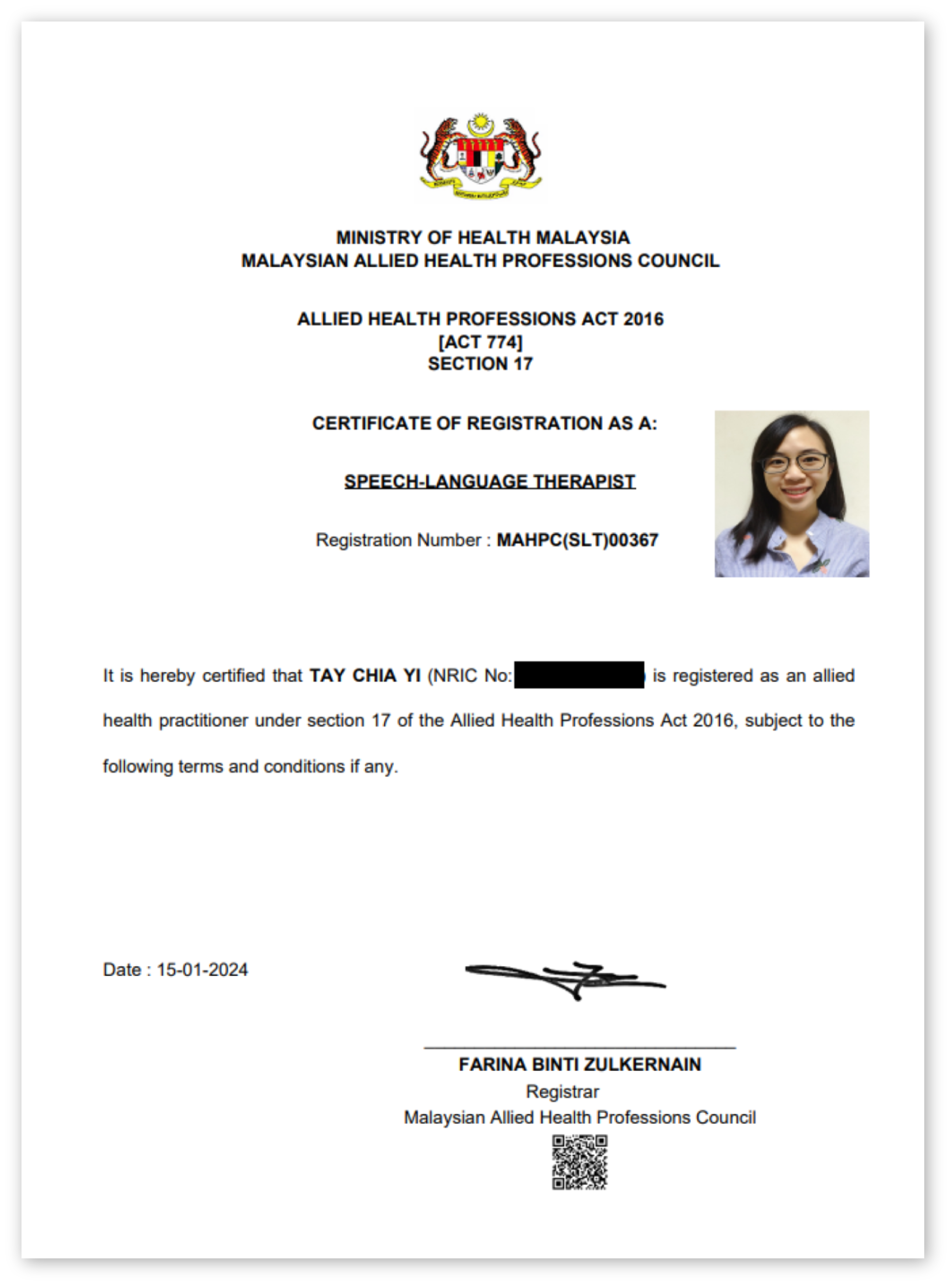How to Choose a Speech-Language Therapist (SLT) in Malaysia
With over 300+ speech-language therapists (SLTs) practising in Malaysia, choosing one who could support you or a loved one is a crucial step towards improving communication skills and overall quality of life.
Here’s a guide to help you navigate this important decision in Malaysia:
Understanding the Role of a Speech-Language Therapist
An SLT helps individuals with various communication and swallowing disorders. They work with people of all ages, from children struggling with speech-language development to adults recovering from strokes or managing other conditions like cancers, brain injuries, Parkinson’s or dementia that affect their communication and swallowing abilities.
Identifying Your Needs
The first step in choosing an SLT is to identify your specific needs or the needs of your loved one. Common areas of focus include:
- Speech Disorders: Difficulty in forming sounds or words.
- Language and Literacy Disorders: Problems understanding or using words correctly.
- Social Communication Disorders: Challenges in using verbal and/or nonverbal communication
- Voice Disorders: Issues with pitch, volume, or quality of voice.
- Difficulties in swallowing food or liquids.
Understanding the specific challenges will help you find an SLT with the right expertise.
Research and Recommendations
Start by researching local speech-language therapists. You can ask for recommendations from:
- Professional Association: The Malaysian Association of Speech-language & Hearing (MASH) has a list of registered members sorted according to location (e.g. Selangor, Sabah, Sarawak) and types of services (e.g. public, private, home visits) in their directory. Do note that there are some SLTs who are qualified to practise but not affiliated with MASH as a member.
- Healthcare Providers: Doctors, especially paediatricians or neurologists, often have contacts with reputable SLTs.
- Schools and Educational Institutions: Schools sometimes have SLTs on staff or can recommend local professionals in their network.
- Support Groups and Online Communities: Parents and individuals dealing with similar issues can offer valuable insights and recommendations.
Checking Qualifications
In Malaysia, qualified SLTs should have a relevant degree from an accredited institution as listed here. SLTs must be registered with the Malaysian Allied Health Professions Council (MAHPC) to be able to practise under the Allied Health Profession Act 774. This means they will have at least a Bachelor’s Degree in Speech Pathology/Speech Sciences or a Clinical Masters in Speech Therapy with clinical log hours.
The council is still working on registration and does not have a portal for members of the public to check [as of July 2024], queries can still be emailed to mahpc@moh.gov.my if authenticity is queried. SLTs must be able to produce a registration number and a certificate to practise which looks like this:

Assessing Compatibility
The relationship between the SLT and the patient is essential for successful therapy. Schedule an initial consultation to see if the SLT’s approach aligns with your needs and if you feel comfortable with them. During this meeting, consider the following:
- Communication Style: Does the SLT explain things clearly and listen to your concerns?
- Personality: Is the SLT patient, empathetic, and encouraging?
- Therapy Approach: Do they use methods that you believe will work well for you or your loved one? What is the evidence (e.g. published articles, statistics, journals beyond personal account/reviews etc.) behind their approaches?
Evaluating the Therapy Plan
An SLT should provide a clear, individualised therapy plan. This plan should outline the goals, the methods to be used, and an estimated timeline for progress. Make sure the plan is realistic and tailored to your specific needs and personal goals. Here are some questions you could ask your SLT:
- What are the risks?
- Are there simpler, safer options?
- What happens if I don’t do anything?
- How do we measure if there is (or no) improvement?
Considering Logistics
Practical considerations are also important. Speech therapy fees can be expensive in private healthcare and rehabilitation plans are often long-term. Think about the following:
- Location: Is the facility conveniently located? Is the SLT providing teletherapy options?
- Availability: Does the SLT’s schedule align with yours? Who is their replacement during their absence?
- Cost: Are the sessions affordable, and are they covered by insurance or other funding options by charities/NGOs?
e.g. the Malaysian Resource Centre for Hearing and Speech-language (MARCHES) sponsors speech therapy sessions for children from certain socioeconomic bands by paying SLTs directly
Continuous Evaluation
Conclusion
Choosing an SLT in Malaysia involves careful consideration of qualifications, evidence-based practice, compatibility, and practical logistics. By taking the time to research and evaluate your options, you can find a therapist who will effectively support you or your loved one on the path to better communication and improved quality of life.
Author
This article is written by Tay Chia Yi, a hospital-based speech-language therapist (SLT) specialising in acute care. She also works in community rehabilitation with NGOs, supporting care partners and people living with dementia. With a passion for neurodiversity-affirming approaches, she advocates for inclusive, tailored, empathetic approaches to supportive therapy. Currently, Chia Yi serves as the President of the Malaysian Association of Speech-Language & Hearing (MASH), championing the rights and well-being of disabled communities and their care partners. Dedicated to amplifying the lived experiences of marginalised groups, she strives to create inclusive and supportive environments, particularly through advocating for Augmentative & Alternative Communication (AAC). She is able to communicate in Malaysian Sign Language (MySL).

